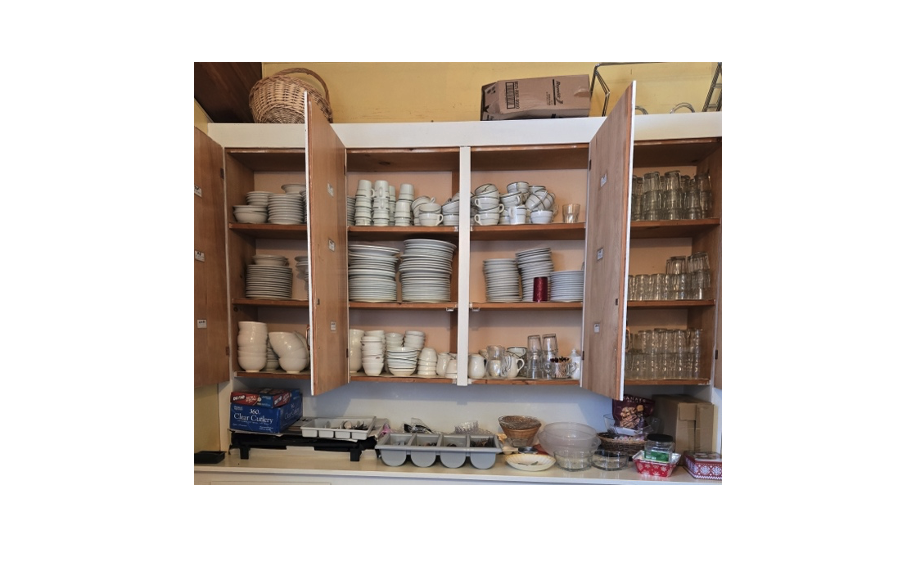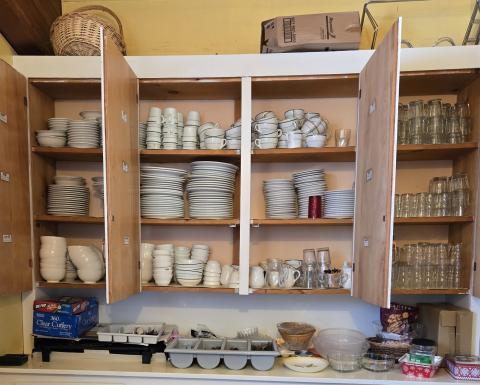
Radical Hospitality Challenge
And Jesus said to them, “Therefore every scribe who has become a disciple in the kingdom of heaven is like the master of a household who brings out of his treasure what is new and what is old.” (Matthew 13:52)
I have visited almost all the churches in our diocese (thirty-one so far!), and while each community is unique and gifted in its own way, there are some common themes. You all have great lay leaders, you all love and care for each other like a family, you all faithfully follow Jesus and serve others, and you all have great coffee hours. Keep up the great work!
Another theme I've encountered, and which I remember from 19 years in a parish, is that over time our spaces tend to accumulate things that no longer serve us and no longer represent our community. I believe facing our accumulations (physical, emotional, and spiritual!) may help us move forward as individuals and communities.
As we approach Lent, I suggest this as an excellent Lenten discipline for individuals, vestries, building and grounds teams, and/or rectors to adapt—the Radical Hospitality Challenge!
What story does your space tell?
Open a cupboard in your church, look at the entryway to your building, the sexton's closet, the space under the stairs, even the area around the altar in the church—is there extra stuff that you don't use cluttering it up? Are pictures and posters outdated? Are signs and directions accurate? Does this clutter matter? I think so. Our spaces send signals to our brains, especially to people visiting for the first time. What might these things signal to a visitor?

You may have curious people showing up to your worship service for the first time. What does it mean to show radical hospitality? We know there is a balance to be achieved when greeting a first-time visitor—something between “Welcome! Would you like to join the vestry/altar guild/be a pledger/run Sunday school?” and “We are a wonderful, close community and everyone pitches in. If you think, act, and speak like us you will fit right in.” Clutter in our spaces, outdated signs, and insider language are unwelcoming. Radical hospitality is not only about welcoming and inclusion but also being willing to change and be changed by new members to our communities.
What are your treasures?
Jesus encourages his disciples to take out of their “treasure what is new and what is old” just after he has told several parables. I think he is suggesting that we must listen to his parables again and again, pick them up, put them down, and pick them up again, in order to understand their meaning in our life now. As communities, our shared stuff—the items we have used in worship and ministry, engagement, and learning—are the parables of our community life. These are things we have used to make the world make sense to us and to work for us. These are the treasures I am encouraging you to bring out—what is old and what is new—to discern what is needed for our ministry together now.
Example: "We use this pledge card every year!" That is a treasure to discern—does it still reflect who we are and what we’re doing? Is it working well, or could it use a refresh?
My challenge to you, parishes, is to do some literal clean-up to help you discern your treasures, who you are, and how your space reflects that. Like any tidying-up project, there will be piles. How you decide together what goes in which pile is a discernment process. Do we keep it? Should it be fixed, refurbished, organized, or used? Should it be donated, or thrown away?
Sorting through our possessions is also a way of revisiting our past and paving the way for radical hospitality. The items in our churches were used and saved for a reason; they teach us about the people, ministry, and missions from our past. They remind us of things that went wrong—have we remembered those lessons? Other items remind us of good times, occasions to celebrate and remember, but maybe not repeat. We also might find items that still have life in them, just waiting to be rediscovered.
I remember finding an old handmade fish fry poster from the early 90s and framing it for our newly renovated church kitchen. Suddenly, a team was inspired to fry fish again. The restart became a successful new fundraiser (raising fun and funds!). On another occasion, a dive into our archives unearthed a vote by our vestry in the early 1960s in which they rejected integration of the neighborhood, prompting an important discussion of why our parish and neighborhood were still predominantly white. We started to tell the truth of our history.
A Personal Radical Hospitality Challenge
This Radical Hospitality Challenge isn’t just for our churches; it can be a powerful metaphor for our own personal spiritual discipline for Lent. You might give something up for Lent, or perhaps start a new good habit, or you might take time this Lent to do a spiritual inventory of your spiritual space and time.
Ask yourself:
How do I spend my time alone/with family/with friends/in the community? Is this feeding my soul?
What are my eating, drinking, and exercise habits? Are they supporting my health?
How am I praying, and where and when?
This Lent, take time to reflect on the treasures of your life—things old and new. Take each treasure out and ask, “Is this feeding/changing/strengthening my Christian life?” “Is this practice making my heart a place of radical hospitality?” Keep what is working, throw away what is pulling you down, practice what you want to get better at, and spend your time, treasure, and talents wisely. Practice saying no to the things you need to say no to, and yes to the things you are called to.
This Lent, take up the Radical Hospitality Challenge as a community and on your own. Lay before God the treasure that is you and ask Jesus to walk with you into the resurrection. Get ready to show a resurrected people and a spruced-up space to those who will join you on Easter Sunday as we celebrate the one whose act of radical hospitality saves us.
